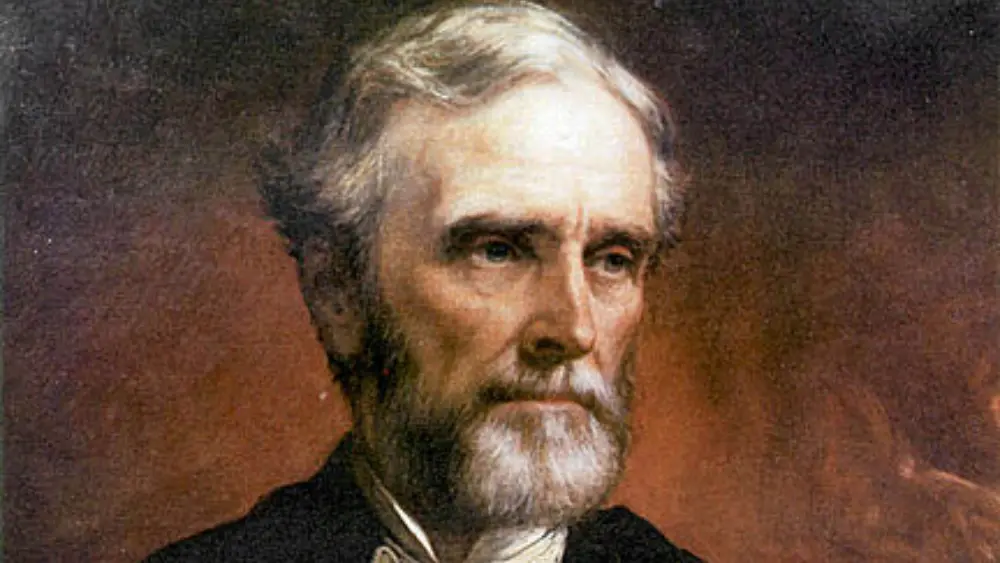Jefferson Davis, a prominent American statesman and leader of the Confederate States of America, is a significant figure in the history of the American Civil War. Davis was born on June 3, 1808, in Christian County, Kentucky, and his influential role in establishing and leading the Confederate government during the unruly period of the Civil War marked his life and political career.
Early Life and Military Career
Born in Kentucky on June 3, 1808, Jefferson Davis’s early life was deeply shaped by the cultural and social dynamics of the American South. During his upbringing, Davis experienced a region characterized by its agrarian economy and reliance on slave labor, which exposed him to the complexities of Southern life and later influenced his political views and actions. His education at the United States Military Academy at West Point laid the foundation for his military career, instilling in him a strong sense of discipline and strategic thinking that would prove instrumental in his later endeavors. Davis’s formative years in the South and his experiences at West Point would play a significant role in shaping his perspectives on governance and leadership, ultimately leading him to become a prominent figure in the complex political landscape of the United States.
Following his graduation from West Point in 1828, Jefferson Davis embarked on a distinguished military career, serving in various capacities within the United States Army. His experience as an officer in the Black Hawk War and the Mexican-American War honed his strategic acumen and leadership skills, earning him recognition for his bravery and tactical prowess. Davis’s military career not only solidified his reputation as a seasoned and capable leader but also provided him with invaluable insights into the geopolitical and social dynamics of the United States, which would later inform his political decisions and shape his role in the events leading up to the Civil War.
Jefferson Davis: Political Career and Advocacy for Southern Interests
Jefferson Davis passionately committed himself to advancing the interests of the Southern states during his political career, especially in preserving the institution of slavery. His involvement in politics began when he was elected to the United States House of Representatives in 1845, where he consistently championed the rights of the South and advocated for the expansion of slavery into new territories. His fervent belief in states’ rights and the sovereignty of individual states in determining their own policies was a driving force behind his political activities. This unwavering advocacy for Southern interests ultimately led him to serve as the Secretary of War under President Franklin Pierce, where he worked to strengthen the nation’s military defenses, reflecting his dedication to safeguarding the South’s way of life.
In 1861, following the secession of several Southern states and the outbreak of the Civil War, they appointed Davis as the President of the Confederate States of America, marking the zenith of his political career. As the leader of the Confederacy, he continued to passionately support the Southern cause, leading the secessionist states in their fight against the Union. Throughout his tenure as the Confederate President, Davis faced immense challenges, including the strains of war and economic hardship, while steadfastly upholding his convictions. His role in the Confederate government and his dedication to the preservation of Southern interests solidified his place as a prominent figure in the unruly history of the United States during the Civil War era.
Leadership of the Confederate States of America
Upon his election as the President of the Confederate States of America in 1861, Jefferson Davis assumed the daunting task of leading a nascent nation embroiled in an unruly struggle for secession and independence. Entrusted with the responsibility of navigating the Confederacy through the upheavals of the Civil War, Davis faced the immense challenge of uniting a diverse coalition of Southern states under a unified cause while contending with the military and economic pressures imposed by the Union. His leadership during this unruly period was characterized by a resolute commitment to the ideals of Southern independence and the preservation of the Confederate way of life, as he sought to rally the Confederate forces and foster a sense of unity and resilience amid the trials of war.
Despite the formidable challenges posed by the conflict, Davis’s leadership of the Confederate States of America was marked by his unwavering determination and steadfast resolve to uphold the principles for which the Southern states had seceded from the Union. While grappling with the complexities of wartime governance and the strains of a faltering economy, he endeavored to maintain the morale of the Confederate troops and civilian population, instilling a sense of perseverance and determination in the face of adversity. Davis’s unwavering dedication to the Confederate cause solidified his status as a prominent figure in Civil War history. His actions left a lasting impact on the Southern states and the legacy of the Confederacy.
Jefferson Davis: Challenges and Controversies
Jefferson Davis’s tenure as the President of the Confederate States of America was fraught with an array of challenges that tested his leadership and the resilience of the Confederacy. Throughout the course of the Civil War, he grappled with significant military setbacks, including the loss of key battles and strategic territories, which placed considerable strains on the Confederate forces and their capacity to sustain the conflict. In addition to external pressures, Davis confronted internal divisions within the Confederacy, as differing regional interests and competing political factions posed a threat to the cohesion of the Southern states. These divisions often hindered the implementation of cohesive military strategies and policies, exacerbating the difficulties faced by the Confederacy in its struggle against the Union.
Amidst the challenges of war, controversies surrounding Davis’s leadership style and decision-making further compounded the complexities of his presidency. Criticisms of his management of military affairs, his handling of governmental policies, and his communication with Confederate officials and military commanders contributed to a climate of dissent and discord within the Confederate government. While Davis endeavored to steer the Confederacy through the perils of war with determination and resolve, the controversies surrounding his leadership underscored the formidable tests of governance and diplomacy that defined his presidency and his enduring legacy in the history of the American Civil War.
Surrender and Post-War Years
Following the surrender of the Confederacy in 1865, Jefferson Davis’s unruly journey took a stark turn as he was captured and imprisoned, signifying the end of the Confederate cause and the beginning of a period of political and personal hardship for the former Confederate President. Davis’s imprisonment and the subsequent period of political isolation underscored the profound divisions and challenges that permeated the post-war landscape, reflecting the deep wounds and enduring animosities that had been wrought by the Civil War. Throughout this trying period, Davis confronted the stark realities of defeat and grappled with the aftermath of the conflict as the nation endeavored to reconcile the legacies of the war and chart a path toward reunification and healing.
Despite the adversities he faced, Jefferson Davis’s resilience and determination remained undaunted during the post-war years. Although he endured a period of incarceration and faced political ostracization, he steadfastly sought to rebuild his life and legacy, advocating for the reconciliation of the nation and the healing of the wounds that had torn it apart. His post-war years were characterized by efforts to reconcile the divided sentiments of the nation, as he worked to find a path forward for himself and the South in the aftermath of the bitter conflict. Davis’s enduring commitment to preserving the honor and dignity of the Confederacy, even in the face of adversity, served as a testament to his unwavering dedication to the ideals for which he had fought, leaving a lasting imprint on the narrative of the American South and the complexities of the nation’s reconciliation
Jefferson Davis: Legacy and Historical Interpretations
Jefferson Davis’s legacy continues to be a topic of historical scrutiny, sparking diverse and often contentious interpretations of his leadership and the ideals that underpinned the Confederacy. While some view him as a staunch advocate for states’ rights and a defender of Southern traditions, others critique his unwavering support for the institution of slavery and his role in leading the Confederacy through a devastating and divisive conflict. His presidency of the Confederate States of America, marked by a complex array of challenges and controversies, has become a focal point for critical analysis, prompting ongoing examinations of his political decisions and the ideological foundations of the Confederacy.
The enduring debates surrounding Jefferson Davis’s historical legacy underscore the enduring complexities of his place in the chronicles of American history, serving as a poignant reminder of the enduring challenges in reconciling the nation’s divisive past. As historians and scholars continue to grapple with the multifaceted implications of his leadership and the broader implications of the Confederate cause, the interpretation of Davis’s legacy remains a dynamic and evolving discourse, reflecting the ongoing efforts to comprehend the lasting impact of the Civil War and its profound repercussions on the trajectory of the United States.
Representation in Memorials and Monuments
The representation of Jefferson Davis in memorials and monuments has become a focal point for debates surrounding the commemoration of the Civil War era and the historical legacy of the Confederacy. While some advocate for the preservation of these monuments as a means of honoring Southern heritage and historical memory, others argue that they symbolize a painful legacy of racial oppression and division, perpetuating a narrative that glorifies the Confederacy and its ideals. As the nation grapples with the complexities of its past, the presence of memorials and monuments dedicated to figures such as Jefferson Davis continues to fuel discussions about the significance of historical remembrance and the need to critically examine the narratives that these representations convey.
The ongoing controversies surrounding the representation of Jefferson Davis in memorials and monuments highlight the nuanced and often polarizing nature of commemorating the Confederate legacy in contemporary society. As communities and policymakers engage in dialogue about the preservation, removal, or contextualization of these symbols, they confront the intricate intersections of history, memory, and identity, fostering a broader conversation about the complex and enduring legacies of the Civil War and its implications for the collective understanding of the nation’s past.

Jefferson Davis: Impact on the Civil War Narrative
Jefferson Davis’s significant role in the American Civil War narrative serves as a poignant reminder of the deep-seated divisions and complex ideological conflicts that defined the nation during an unruly period. As the President of the Confederate States of America, Davis embodied the fervent beliefs and convictions of the Southern states, leading the charge in defense of the principles and values that had driven the secessionist movement. His unwavering commitment to the Confederate cause and leadership in the face of formidable challenges left a lasting mark on the Civil War. This legacy highlights the enduring impact of a conflict that reshaped the social, political, and cultural landscape of the United States.
Davis’s pivotal role in the Civil War narrative continues to shape the collective understanding of the ideological struggles and regional tensions that defined the era, underscoring the complexities of a nation torn apart by conflicting visions and competing interests. As historians and scholars delve into the complexities of the Civil War period, Davis’s legacy remains intertwined with the broader exploration of the war’s impact on the trajectory of American history, prompting critical reflections on the enduring legacies of the conflict and the ongoing efforts to reconcile the nation’s unruly past.










